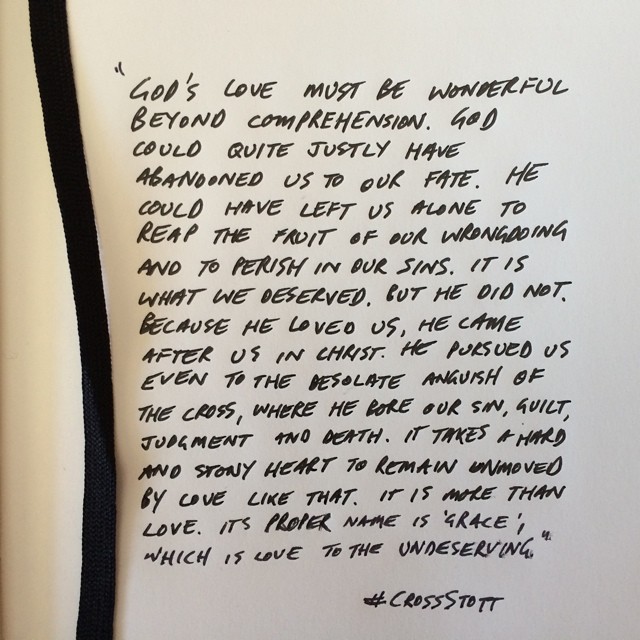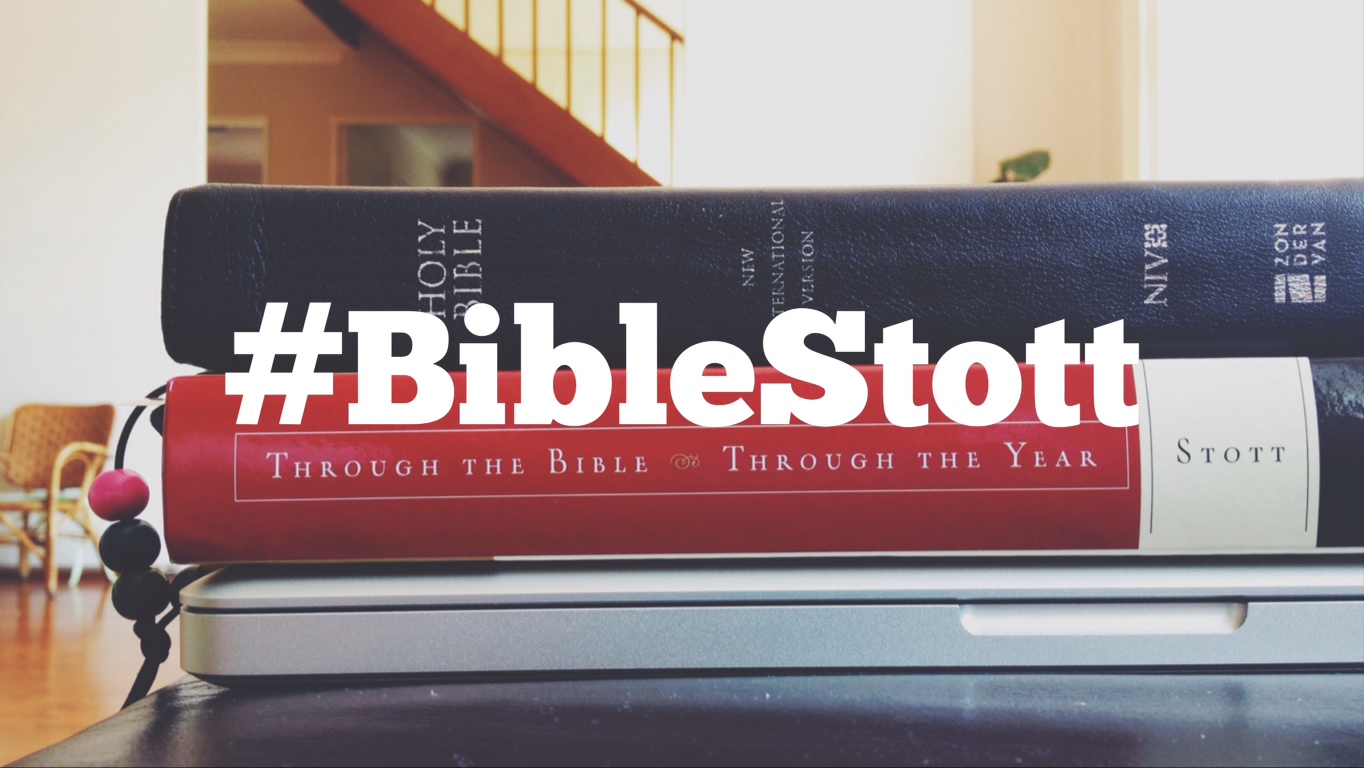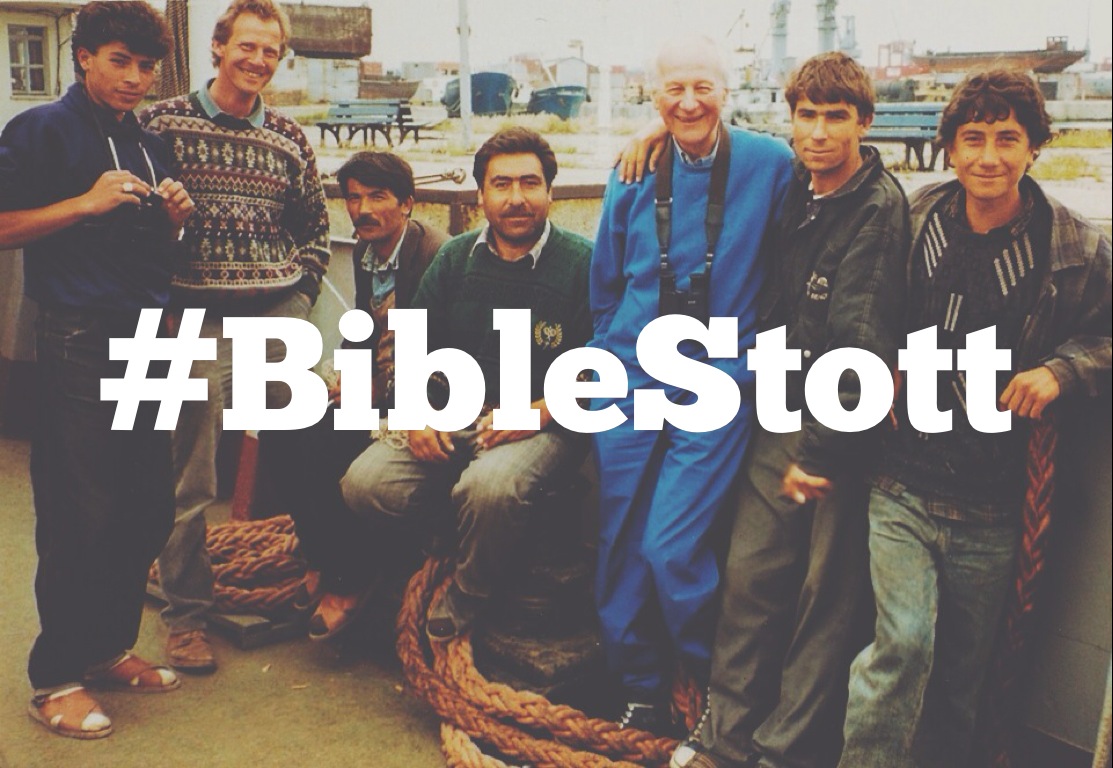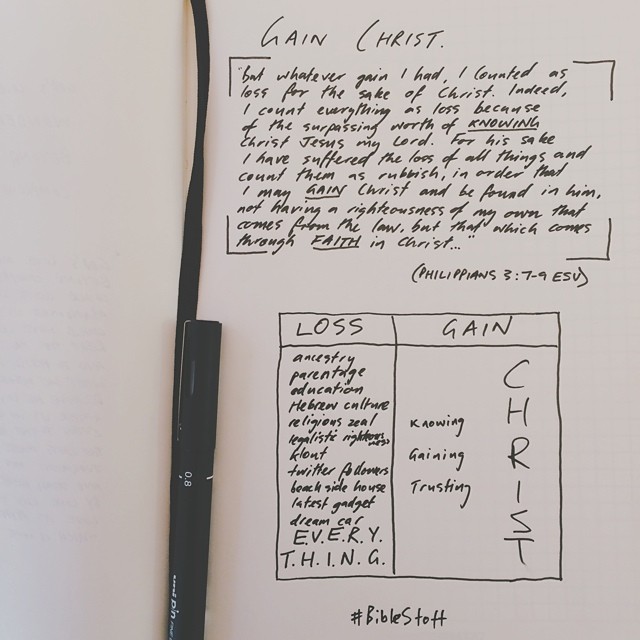
// WONDERFUL BEYOND COMPREHENSION #CROSSSTOTT
LOOKING FOR A BIBLE READING PLAN? NOT TOO LATE TO JOIN #BIBLESTOTT
One week down, fifty-one to go! A week ago I shared a new Bible reading plan by John Stott that I have just begun. You can read all about it here: davemiers.com/BibleStott. Basically it’s an overview of the whole Bible based around some key dates in the church calendar.
Here are 5 reasons I am really enjoying this plan:
Continue reading “LOOKING FOR A BIBLE READING PLAN? NOT TOO LATE TO JOIN #BIBLESTOTT”
THROUGH THE BIBLE // THROUGH THE YEAR // WITH JOHN STOTT #BibleStott
I’ve been doing the same bible reading plan for the last 4 years. It’s time to mix it up a bit! So starting on September 1 I am beginning a 12-month reading plan written by John Stott. John Stott, who died at the age of 90 in 2011, is one of my favourite authors. I appreciate his clear, compelling and Christ-centred writing. His commentaries in the Bible Speaks Today series have been a particular help in preaching. The new reading plan is from a book Through the Bible, Through the Year with ‘Daily Reflections from Genesis to Revelation.’ Stott is the legend flossin the blue tracksuit and bird-watching binoculars in the pic below.
Key features
- Read through an overview of the story of the Bible from Genesis to Revelation
- Each day has a short bible reading with a short devotional comment from Stott
- Each day has a suggestion for further reading in the Bible
- September until Christmas, read the Old Testament story from the creation until the coming of Christ
- January through April, read the story of Jesus in the Gospels
- May through August, read the story of Acts through Revelation
Get the reading plan
- Download the Introduction, overview and the first two weeks of readings with this PDF from Baker Publishing Group
- Download the same introduction for free from the iTunes for use on iOS devices. If you continue beyond the first two weeks you can pay for the rest
- Download ePub or purchase Paperback or Hardback from Koorong
- Purchase hardback from Booko
- Purchase paperback from Booko
Keen to join in?
Doing physical exercise is often easier when you do it in a group. Likewise with spiritual exercise. A number of people have already indicated they’re keen. If you want to join in, let me know in the comments below. If you’re not sure, perhaps you could do the first two weeks for free and then make a decision.
#BibleStott
If you use Twitter, Facebook or Instagram – use the #BibleStott hashtag when sharing Bible verses or reflections of what you’re learning
A DREAM OF A LIVING CHURCH
The following is taken from John Stott’s The Living Church: Convictions of a lifelong pastor. The book is from 2007, but the quote is from one of Stott’s 1974 sermons.
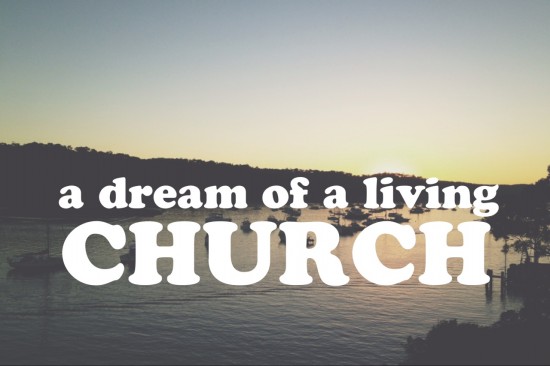
——-
In the Roman Catholic Calendar All Souls Day (2 November) commemorates the souls of the faithful departed who are regarded as being in purgatory. This being so, we at All Souls are often asked why such a committed evangelical church as ours should have been thus named. The answer is not hard to find. We understand that the church founders were determined to build a church large enough to seat all the souls of the parish. Thus their resolve was not to commemorate all the souls of the dead, but rather to accommodate all the souls of the living.
The church was consecrated and opened to the public on 25 November 1824. So when the year 1974 dawned, we were anxious to mark the 150th anniversary of the dedication of the church. I was asked to preach on the nearest Sunday and to look into the future. With due apologies to Martin Luther King and his famous dream speech in Washington, D.C., I concluded my sermon with my own dream:
How did our lives become so plastic?
One of my mates from high school recently spoke at the TEDx event in Newcastle. Check out Tim Silverwood’s presentation, How did our lives become so plastic? –
I’ve been really challenged over the past year as I’ve followed along with some of Tim’s environmental work to be more deliberate in caring for creation.
In John Stott’s final book, The Radical Disciple, he has a chapter on Creation-Care. As well as Tim’s practical example, I found Stott’s challenge in this chapter to be a firm rebuke for a lack of creation care on my behalf.
Stott has this quote from Chris White with a vision for Christians to take their environmental responsibility seriously:
They choose sustainable forms of energy where possible. They switch off unneeded appliances. They buy food, goods and services as far as possible from companies with ethically sound environmental policies. They join conservation societies. They avoid over-consumption and unnecessary waste and recycle as much as possible.
Here is Stott’s conclusion:
It seems quite inexplicable to me that there are some Christians who claim to love and worship God, to be disciples of Jesus, and yet have no concern for the earth that bears his stamp of ownership. They do not care about the abuse of the earth and indeed, by their wasteful and over-consumptive life-styles, they collude in it.
God intends… our care of the creation to reflect our love for the Creator.
To the LORD your God belong the heavens, even the highest heavens, the earth and everything in it (Deuteronomy 10:14).
Check out the Evangelical Declaration on the Care of Creation, a foundational statement for those engaged in the ministry of creation care.
What are some practical ways that you are seeking to take care of creation?
Be Filled With The Spirit – John Stott
The following quote is from the end of John Stott’s commentary on Ephesians 5:18-21 (I think it’s also in his book Baptism and Fullness). Most of it is on the cutting room floor for my sermon on “Filled with the Holy Spirit”. Still worth a read.

We need now to return to the imperative on which these four participles depend, that is, to the Christian duty and privilege from which these four Christian attitudes result. It is the command Be filled with the Spirit. The exact form of the verb pl?rousthe is suggestive.
First, it is in the imperative mood. ‘Be filled’ is not a tentative proposal, but an authoritative command. We have no more liberty to avoid this responsibility than the many others which surround it in Ephesians. To be filled with the Spirit is obligatory, not optional.
Continue reading “Be Filled With The Spirit – John Stott”

